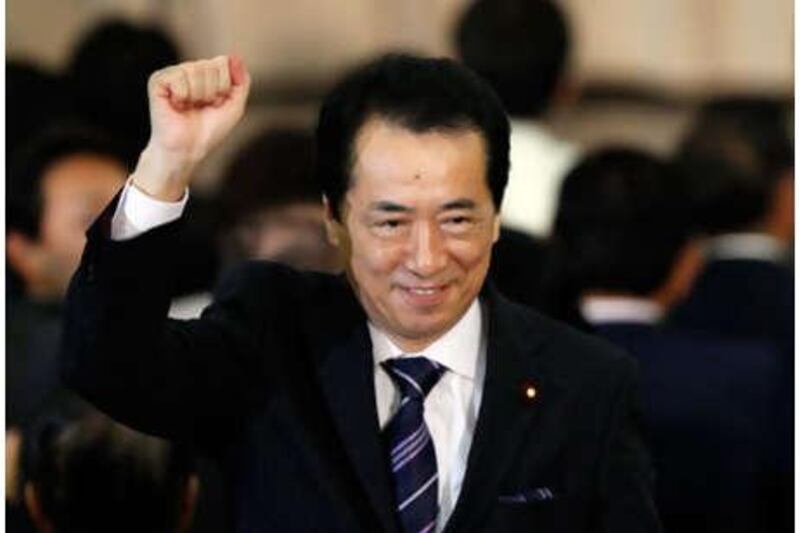TOKYO // Japan's lower house elected Naoto Kan as the new prime minister today, handing the outspoken, grass-roots populist the task of quickly reclaiming public support squandered by his predecessor ahead of July elections. "My task is to rebuild this nation," Mr Kan said after he was chosen ruling party chief. Pledging to confront problems linking "money and politics," he also stressing the need to spur economic growth.
Mr Kan, 63, was finance minister under the unpopular Yukio Hatoyama, who stepped down on Wednesday amid plunging approval ratings over broken campaign promises and a political funding scandal. As prime minister, Mr Kan faces daunting choices in how to lead the world's second-largest economy, which is burdened with massive public debt, sluggish growth and an aging, shrinking population. He must also rally voter support ahead of upper house elections next month.
Mr Kan, known for standing up to Japan's powerful bureaucrats, is the country's sixth prime minister in four years. "We will work together as one in the face of the tough political situation and the upcoming upper house election and fight together unified," he said after the party vote. "Our first priority is to regain the trust of the people." The path to the parliamentary vote began in the morning, when Hatoyama's Cabinet resigned en masse. Then the ruling Democratic Party of Japan voted Mr Kan as its new leader. The lower house convened a couple hours later to approve Mr Kan as prime minister.
Mr Kan received 313 votes out of 477, with Liberal Democratic Party head Sadakazu Tanigaki getting 116. The rest went to other candidates of smaller parties. The upper house will vote later, but the result is largely ceremonial because the more powerful lower house can over-ride its decision if needed. On foreign policy, Mr Kan described the relationship with the US as vital, but stressed the importance of Japan's ties with regional neighbours.
"With the US-Japan alliance the cornerstone of our diplomacy, we must also work for the prosperity of the Asian region," he said ahead of the ruling party vote. In that contest, Mr Kan defeated little-known Shinji Tarutoko, chairman of the lower house environmental committee, by a vote of 291-129, with two invalid ballots. Afterwards, the two shook hands and raised their hands together. In a written candidate's statement today, Mr Kan identified economic recovery and growth as Japan's biggest challenge. Japan is the slowest growing economy in Asia, and will almost certainly be overtaken in size by China sometime this year. While exports and factory output are rising, unemployment and deflation are worsening.
"I will tackle and pull Japan out of deflation through comprehensive measures from the government and the Bank of Japan," he said in the statement, hinting that he would seek greater cooperation from the central bank. He pledged to resume fiscal reforms and work toward sustainable finances, including possible tax hikes, to ensure a strong social security system for Japan's aging population. Addressing concerns about financial scandals, he vowed to keep politics clean and tighten campaign financing laws.
* AP





